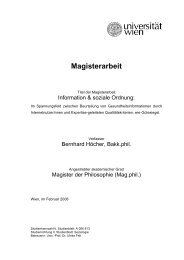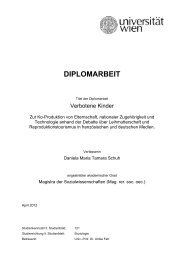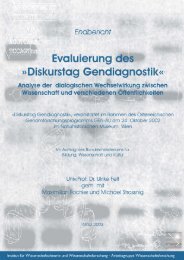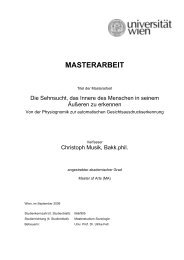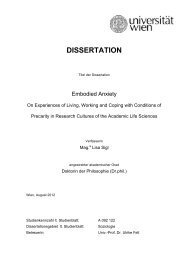MASTERARBEIT - Institut für Wissenschaftsforschung - Universität ...
MASTERARBEIT - Institut für Wissenschaftsforschung - Universität ...
MASTERARBEIT - Institut für Wissenschaftsforschung - Universität ...
You also want an ePaper? Increase the reach of your titles
YUMPU automatically turns print PDFs into web optimized ePapers that Google loves.
2.3 literature bodies about and around zeppelins 17<br />
2.3.1 Biographic Accounts<br />
A first very important category is biographies, most of them about<br />
Ferdinand Graf von Zeppelin. As the zeppelin technology has always<br />
been associated closely with its inventor and its development<br />
depended a lot on Zeppelin’s personal finesse, those accounts give<br />
important insights. The by far most important source in this category<br />
that has already been cited abundantly in this piece of writing<br />
is the biography »Graf Zeppelin – Sein Leben nach eigenen Aufzeichnungen<br />
und persönlichen Erinnerungen« by Hugo Eckener [11] that I used<br />
for the short introduction above. As mentioned above, it contains<br />
very detailed accounts of Zeppelin’s life and background as well as<br />
a comprehensive chronology on the zeppelin technology. Eckeners<br />
close personal relation to Zeppelin and his involvement in the zeppelin<br />
companies make his accounts extremely valuable. Nearly all<br />
accounts on Zeppelin are based on this book in one way or another.<br />
Hans Rosenkranz’s book »Graf Zeppelin - Die Geschichte eines abenteuerlichen<br />
Lebens« [43], a second big monograph on Zeppelin’s person in<br />
turn offers relatively little. At times he is coming up with new information,<br />
which rather raises doubt than curiosity as it often draws<br />
different pictures than other authors - especially Eckener. Considering<br />
it was released during the short period of airship glory in the<br />
Weimar Republic - and seven years before Eckener’s work on the subject<br />
- it has to be considered as a glorifying narrative of Zeppelin as<br />
a popular hero that has been outdated by Eckener’s book. The details<br />
Rosenkranz brings up simply seem to be unreliable, especially<br />
in direct comparison to Eckener. Therefore, I rely on Eckener’s book.<br />
Despite some of the authors I cite use it, my personal judgement<br />
led me to mistrust it and therefore not paying further attention to it.<br />
Two more recent pieces close the circle: Clausberg [6] and Italiaander<br />
[25] both dedicated monographs to the life of Zeppelin. Both have a<br />
similar structure – instead of one continuous narrative like Eckener’s<br />
work, they both divide their books into different chapters. This structure<br />
allows for a more comprehensive and detailed approach to different<br />
aspects of Zeppelin’s life easier. Additionally, there is a multitude<br />
of small pieces on Count Zeppelin. Many of those are relatively recent<br />
and of high quality regarding their accomplishments in discovering<br />
and analyzing new material or obtaining untouched sources. Typically<br />
these papers focus on individual aspects of Zeppelin’s life - e.g.<br />
by Barbara Waibel [49], head researcher at the Zeppelin Archives, on<br />
Zeppelin’s desperation after his discharge and the motivation this fact<br />
brought along that was cited above. Several of those shorter pieces are<br />
collected in an anthology on the occasion of an exhibition for the centenary<br />
of LZ-1’s maiden flightMeighörner and Zeppelin-Museum [35].<br />
While all of these accounts largely rely on Eckener’s work, they still<br />
end up with more balanced narratives than Eckener’s very positive



